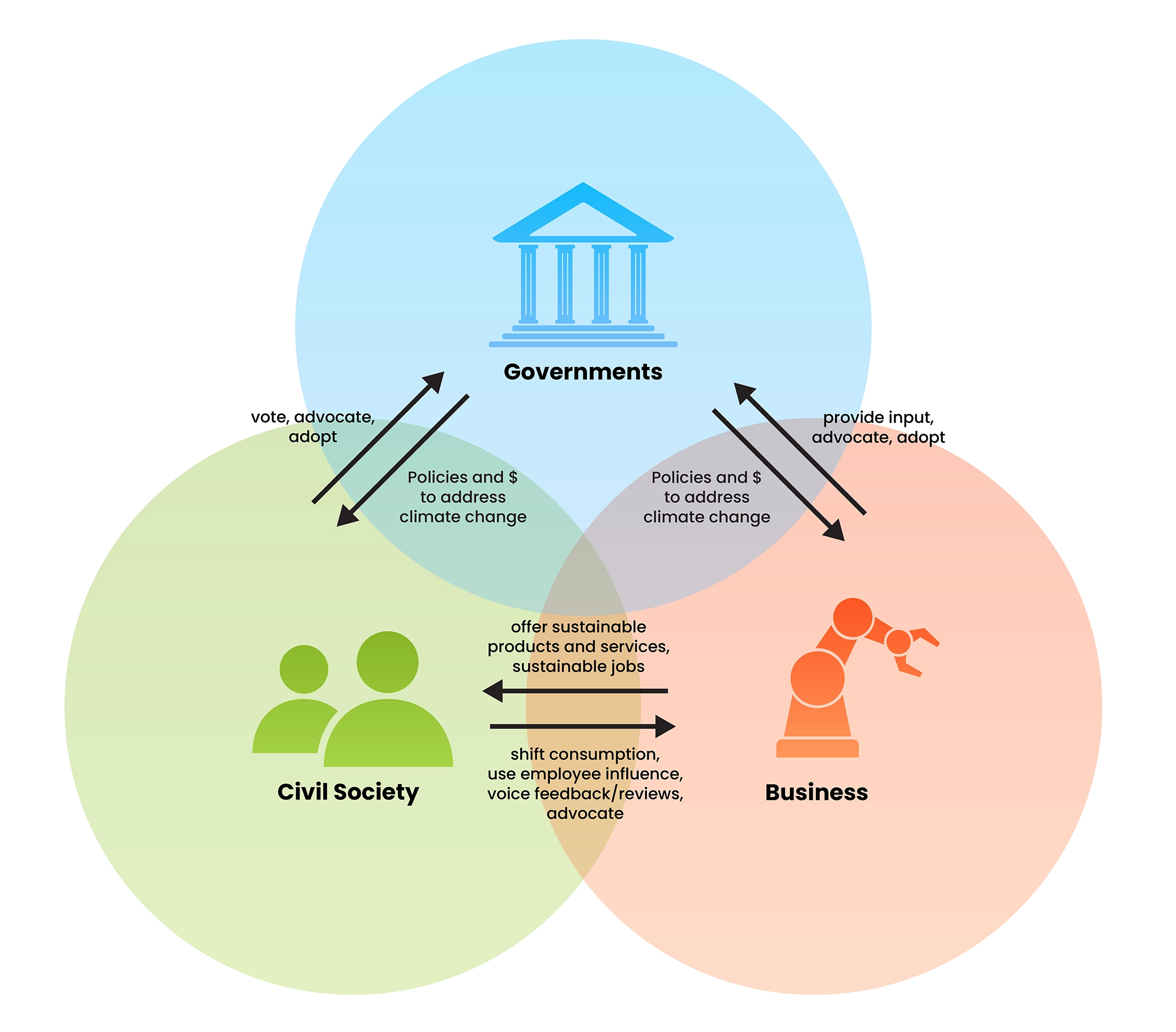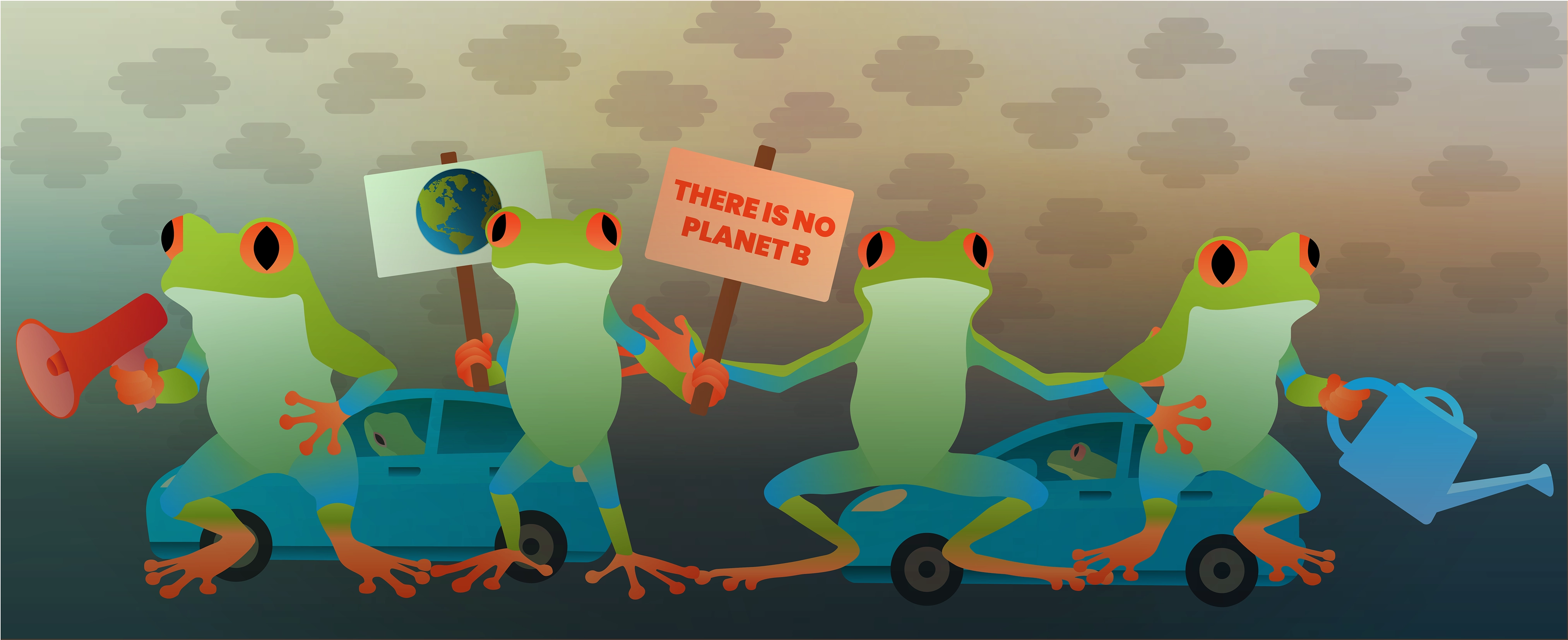On this page…
• Everyone is just one individual
• You aren’t alone
• It’s only a matter of time anyway
• As a Canadian, reducing your individual footprint will have a disproportionately large positive impact on global warming
• Your impact will go beyond your own footprint
• Systemic change requires individual action
• The process of understanding the problem and making a concrete plan of action
• You have more power to act than most beings that global warming impacts
• Every bit of warming matters, every year matters, every choice matters
Why Individual Action Matters
Most Canadians understand that climate change is a human-caused problem that we need to address.
And yet, there is still a large gap between:
1) the acceptance of facts,
2) concern about the issue and its global impacts today
3) a desire to protect the earth for our children and future generations.
and
the level of action that is required to address the crisis.
If you want to take action or if you want additional inspiration when talking to others who aren’t taking action, read on.
It is understandable to feel a disconnect between the problem of climate change and your own life given the magnitude of the problem and your small contribution.
It is also understandable to want to avoid negative news and political posturing, to be exasperated with conflicting information and be worried about the future.
But your actions are vital to the success of society in solving this critical problem.
Why individual action matters

“I am a drop in the ocean. I am just one individual. Reducing my Carbon Footprint won’t move the needle. My actions don’t matter in the grand scheme of things…”

Everyone is just one individual and it is only individual action that can make this transition happen. Yes, some individuals emit more and need to do more to curb their emissions. And some people have a bigger scope of influence and need to do more.
But what about you as an “average person”? You may feel like a tiny drop in a bucket and that you have a small scope of influence — but the ask of you is proportional to the size of your impact.

If you just reduce your own small footprint and support systemic change wherever possible, that’s perfectly fine. Lots of people have more power and scope of influence than the average person and are taking greater action. And we can try to support them in their efforts and feel gratitude for the work they are doing (without guilt.) We may not be in a situation to do more ourselves. It is our collective actions (big and small) that will get us to the other side. And every bit of emissions that is averted counts.

You aren’t alone. You are an individual within one of two groups. You are either among the tens of millions that both care and are willing to do something about the climate crisis however small — remembering that it is a transition and we will all have a Carbon Footprint during the transition — or you are among those that are living in a ‘business-as-usual with no desire to change’ world.

You are either contributing to an overall increase in greenhouse gas emissions or an overall decrease in greenhouse gas emissions. There is no neutral. Which ocean do you want to be a drop in? The momentum of positive action is tangibly accelerating across the globe. Come and be part of that sea of change.

It’s only a matter of time anyway. For most of us, the question isn’t ‘whether’ we will be transitioning to a low carbon economy or not, but rather ‘when’, or ‘how quickly’.
The answer to ‘when’ will determine how much loss and damage we (and the world) will suffer and how much we have to pay. Mitigation, adaptation, and loss and damage all have a bigger price tag the longer we wait.

It’s only a matter of time until we will all have to switch to newer, cleaner technology and systems. But the longer we wait to take action, the worse and more costly it will be for humans around the globe, for other species, and for the next generation. The time to plan your transition and start taking concrete steps is now!
The sustainable habits you foster today will make your own transition smoother too, for example, if you have already found alternatives to plastic bags, you won’t miss them when they are phased out.
You don’t have to do everything all at once and you may not be able to change some big rocks yet but that’s ok. It’s a process and there may be some hurdles that you or society needs to overcome first.
There are many ways to effect change. The ask is to act now versus later because later is too late.

As a Canadian, reducing your individual footprint will have a disproportionately large positive impact on global warming.
Canadians have one of the largest per capita footprints in the world. Your individual actions have a big global impact. Even though we have exceptionally clean and cheap electricity compared to other developed countries, we live carbon intensive lives and have a carbon intensive economy.
There is a lot of room to shift away from our carbon intensity and a lot of individual options to choose from.
If you think your footprint is too small to matter, just think about the millions of people addressing the crisis who have a footprint that is a fraction of yours.


Your actions may focus on your footprint, but your impact will go beyond your own footprint.
Even if you don’t intend to, you will be helping to drive personal change in others and systemic change in your community and beyond

When people see others changing they are more likely to change too, they are more likely to talk about changes and they are more likely to elect and direct leaders — from all political parties — who support and accelerate the needed change.
And once change reaches certain ‘positive social tipping points’ it accelerates, facilitating rapid shifts to a better ‘new normal’. Importantly, when young people see that we care enough to change, we give them hope for their futures.

Systemic change requires individual action. When individuals make a committed climate action plan with integrity as a starting point — they reduce their Carbon Footprint, but they make a difference in other ways too.
Systemic change cannot happen — i.e. governments can’t do their part — without public support.

And businesses can’t be successful in their efforts without the support of consumers. See more on this point below.

The process of understanding the problem and making a concrete plan of action will turn anxiety or guilt into positive energy and hope and you will…
a) start to see all of the many ways that you can act to address climate change, not just with your wallet but with your behaviour, voice and vote and other choices;
b) be inspired by all of the things that others are doing as well; and

c) be more likely to support efforts of others leading us out of the crisis and stop supporting those that are funding it and causing it.

You have more power to act than most beings that global warming impacts.
The whole world feels or will feel the serious negative consequences of global warming. We are all negatively impacted by climate change. Even if you never think about it, never travel, avoid all news and are not in a risk prone area, it will still impact your cost of living and it will likely directly impact someone you know and love.

Your children and grandchildren will be impacted by climate change. Everyone else, all other species and all future generations are or will be negatively impacted.
But we don’t all have the same power to address the climate crisis.
Future generations need us to do it because later is too late.
Other species need us to do it.
And in the developed world, we have far greater means to address the issue and a far bigger footprint to reduce than most of the rest of the world does.
Our actions do matter.

“Every bit of warming matters, every year matters, every choice matters”
— Petteri Taalas, Secretary-General World Meteorological Organization, Joyce Msuya, Acting Executive Director, United Nations Environment Program
Even if your footprint is extremely small and/or you can’t control your emissions through personal choices (e.g. you don’t control your home heating or the emissions from public transit) there are still many positive ways to take action through your voice and vote.
You get to have a say. It’s your world too.

Explore how to build resilience, motivation and optimism to overcome inaction.
Explore what you can do about climate change.
Create a personalized plan that works for you — there are many potential paths that lead to the same positive outcome.
Change requires all of us
Is it the responsibility of individuals, governments, or business to address climate change?
All of the above!
Governments can set the direction and conditions for change using carrots and sticks—policies and law, financial subsidies, investment and other incentives and financial disincentives like taxes, fines, etc. But they need business and civil society (all of us) to support and help implement the changes.
Governments are already (rightfully) involved in energy security, infrastructure, business innovation, employment security, housing, food security, public health and safety, protecting natural resources and public land, pensions etc. etc. all of which are relevant to the clean energy transition.

The private sector (business) needs governments as well. Not just for financial support, permitting, and operational policies (e.g. safety, employment) but also for concrete direction setting. To make the upfront investment in new innovations, for example, businesses need to know that this is the future direction that is supported by government policy and incentives.
Predictable carbon taxes, for example, signal that it is safe and worthwhile to invest in renewable or other low carbon alternatives.
There are many, many examples of the interdependencies of government, business, and individuals in effecting change. Without individuals (as citizens, consumers, employers/employees and community members) working with companies and governments and each other, we won’t succeed in addressing the crisis and it will continue to get worse.

